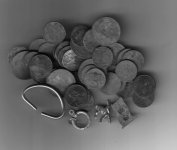trash n cash
Jr. Member
Hi, I want to buy a new detector. It will be my first, so instead of asking what is the best detector? I will start my research into multiple freq. or single freq. detector. Is there something to gain by getting a multiple freq. over a single freq? I will do most of my hunting for coins around northern Ill. No great lakes beaches, but a slight possibility so I don't rule that out. I am tech savvy, and don't mind learning something hard. A top end detector is what I will get.( because I like bells and whistles ) I work for a railroad around Chicago and being outside digging up old stuff is nothing new. I feel metal detecting would be the next step as a hobby. Thanks... Trash n Cash






